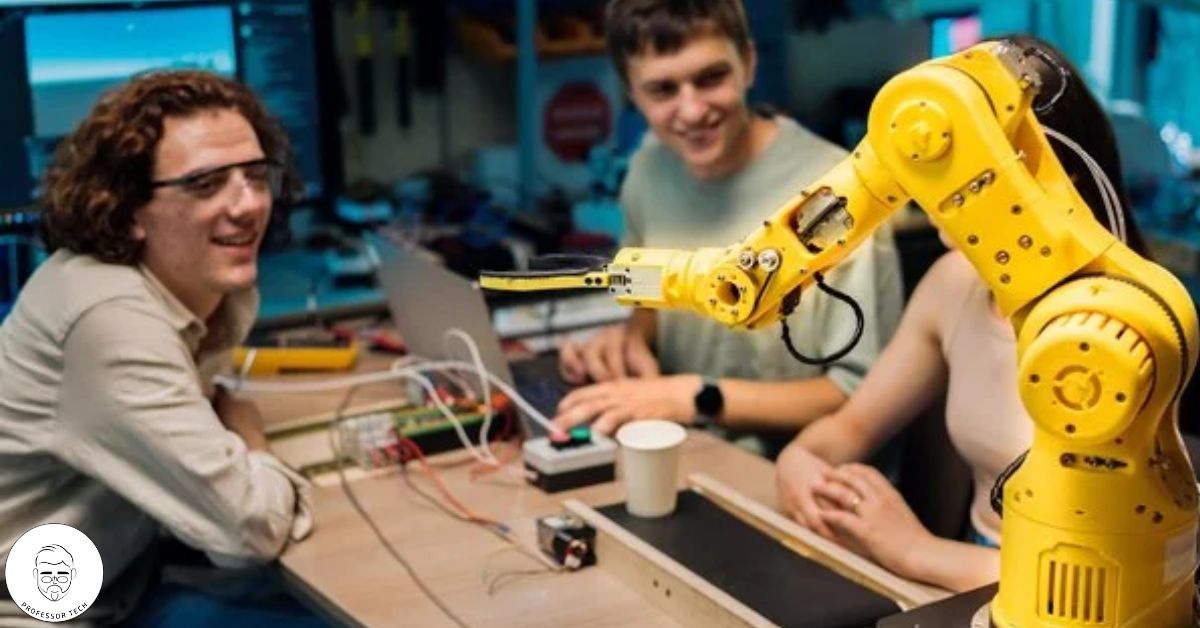Introduction
Artificial Intelligence (AI) has become a buzzword in the tech industry, transforming the way we live, work, and interact with technology. In this article, we’ll explore the multifaceted impact of AI on the tech sector and beyond.

Historical Perspective
Evolution of AI in Tech
AI’s journey in the tech industry dates back to its conceptualization, tracing its roots from the early days of computer science. Over the decades, it has evolved from basic rule-based systems to sophisticated machine learning algorithms.
Milestones and Breakthroughs
The tech industry has witnessed significant milestones in AI, from IBM’s Deep Blue defeating a chess grandmaster to breakthroughs in natural language processing and image recognition.

AI Applications in Tech
Automation and Efficiency
AI has revolutionized processes through automation, streamlining tasks and improving efficiency across industries. From manufacturing to customer service, AI-powered systems are optimizing operations.
Data Analysis and Insights
In the era of big data, AI plays a pivotal role in analyzing vast datasets, extracting valuable insights, and facilitating data-driven decision-making for businesses.

Cybersecurity
The tech industry benefits from AI in bolstering cybersecurity efforts. Machine learning algorithms detect and mitigate threats in real-time, providing robust protection against cyber-attacks.
Virtual Assistance
Virtual assistants powered by AI, like Siri and Alexa, have become integral parts of our daily lives, simplifying tasks and enhancing user experiences.
Impact on Job Landscape
Job Automation Concerns
The integration of AI has sparked concerns about job displacement, with automation potentially replacing certain roles.
Emergence of New Job Roles
Simultaneously, the tech industry sees the emergence of new job roles focused on AI development, maintenance, and ethical oversight.
AI Ethics and Challenges
Ethical Considerations
AI poses ethical challenges, such as biases in algorithms and decision-making. Addressing these concerns is crucial for responsible AI deployment.
Addressing Bias in AI
Efforts are underway to mitigate bias in AI systems, emphasizing fairness and transparency in algorithmic processes.
Security and Privacy Concerns
The increasing reliance on AI raises concerns about data security and privacy. Striking a balance between innovation and safeguarding user information is a priority.
AI-driven Innovations
Robotics and Automation
AI-driven robotics are transforming industries, from manufacturing to healthcare, enhancing precision and efficiency.
Machine Learning and Predictive Analytics
Machine learning algorithms enable predictive analytics, offering valuable insights for businesses to anticipate trends and make informed decisions.
Natural Language Processing
Advancements in natural language processing empower AI systems to understand and respond to human language, revolutionizing communication interfaces.

AI Adoption in Different Sectors
Healthcare
AI applications in healthcare range from diagnostics to personalized treatment plans, improving patient outcomes and optimizing medical processes.
Finance
In the financial sector, AI enhances fraud detection, risk management, and customer service, contributing to a more secure and efficient financial ecosystem.
Education
AI aids personalized learning experiences, adapting to individual student needs and revolutionizing education delivery methods.
Manufacturing
From predictive maintenance to autonomous production lines, AI is reshaping the manufacturing landscape, increasing efficiency and reducing costs.
Future Trends in AI
Continued Integration in Tech
AI’s integration into everyday tech will persist, with more industries leveraging its capabilities for innovation and efficiency.
Advancements in AI Research
Ongoing research in AI promises breakthroughs in areas like quantum computing, opening new frontiers for technological advancements.

The Role of AI in Startups
Opportunities for Startups
AI presents opportunities for startups to disrupt industries, offering innovative solutions and gaining a competitive edge.
Challenges and Strategies
Startups face challenges in AI implementation, but strategic planning and collaboration can pave the way for success.

Case Studies
Successful AI Implementations
Examining real-world examples showcases the positive impact of AI across diverse sectors, providing insights into best practices.
Lessons Learned
Understanding challenges and successes from case studies helps refine future AI implementations, fostering a culture of continuous improvement.
AI and Human Collaboration
Augmented Intelligence
AI’s role is not to replace humans but to augment human capabilities, creating synergies that lead to more efficient and innovative outcomes.
Enhancing Human Capabilities
By automating mundane tasks, AI frees up human resources to focus on creative thinking and complex problem-solving.

Overcoming AI Skepticism
Building Trust in AI
Building trust in AI systems is crucial for widespread acceptance. Transparent communication about how AI operates is key.
Public Perception and Education
Addressing misconceptions and educating the public about AI fosters a more informed and accepting society.
The Global AI Landscape
International AI Initiatives
Countries worldwide are investing in AI research and development, contributing to a global landscape of innovation and collaboration.
Collaborations and Partnerships
International collaborations and partnerships are essential for advancing AI on a global scale, sharing expertise and resources.
Investing in AI Skills
Training and Skill Development
As AI continues to evolve, investing in training programs and skill development is crucial for individuals and businesses alike.
Future Job Market Trends
The demand for AI skills will shape the future job market, with opportunities expanding in AI development, ethics, and implementation.
Conclusion
In conclusion, the impact of AI on the tech industry is profound, reshaping how we live and work. As we navigate the evolving landscape, embracing the potential of AI while addressing ethical considerations is key for a sustainable and inclusive future.
Frequently Asked Questions
How fast is AI growing in the tech industry?
AI adoption in the tech industry is growing rapidly, with advancements in machine learning, robotics, and natural language processing driving innovation.
What are the main challenges in AI implementation?
Challenges include ethical concerns, bias in algorithms, and the need for robust cybersecurity measures to ensure responsible AI deployment.
Can AI completely replace human jobs?
While AI automates certain tasks, it also creates new job opportunities in AI development, oversight, and maintenance. It aims to augment human capabilities rather than replace them.
How is AI addressing bias in its algorithms?
Efforts are underway to address bias through ethical AI practices, transparency, and ongoing research to improve algorithmic fairness.
What role does AI play in startups?
AI presents opportunities for startups to innovate and disrupt industries. However, strategic planning and collaboration are essential for successful AI implementation



